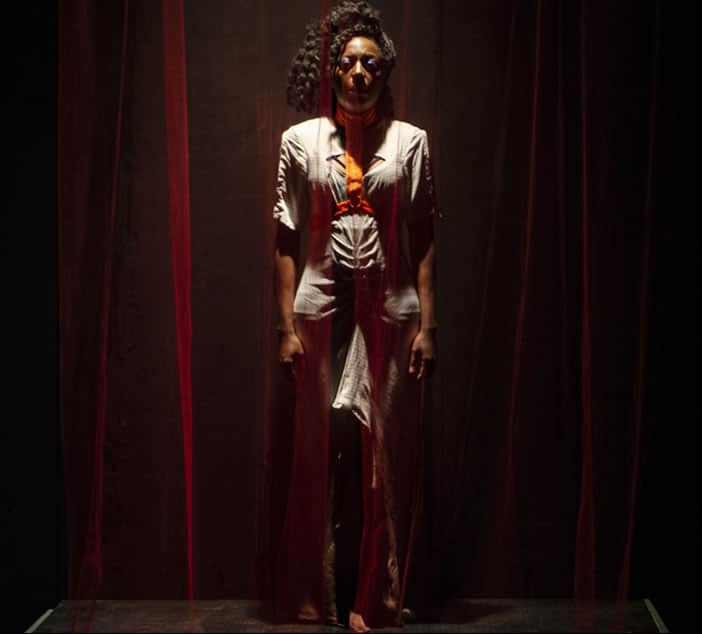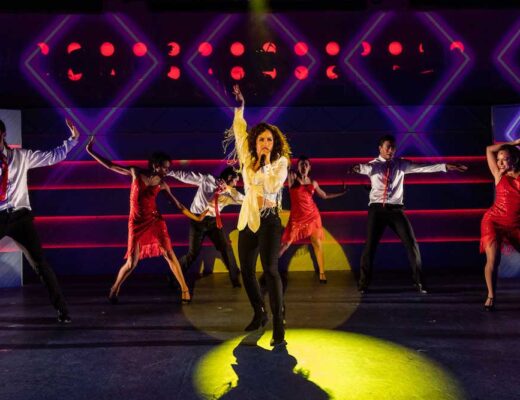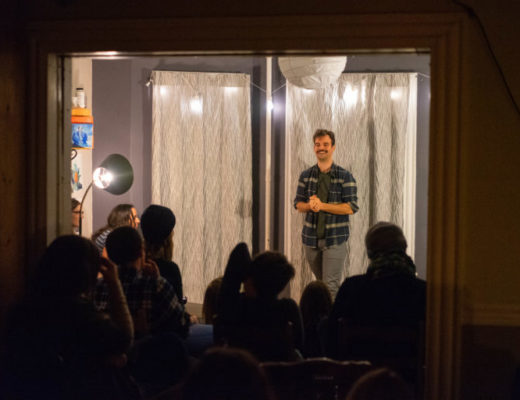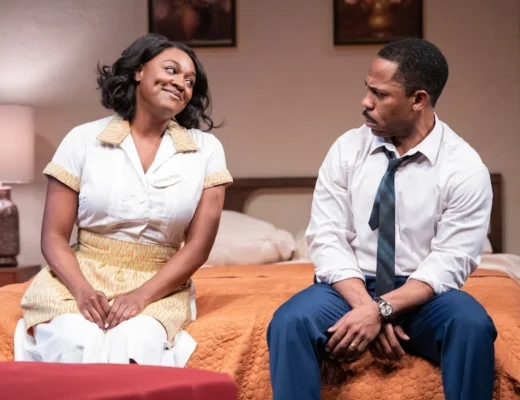by Hannah Berk
This article was first published by DC Theatre Scene and can be read on their site here.
“How to translate [Antigone]?”, Anne Carson self-reflexes in her translator’s note to the Sophokles classic. “I take inspiration from John Cage who, when asked / how he composed 4’33”, answered / ‘I built it up gradually out of many small pieces of silence.’” I begin with the translator because Taffety Punk’s double feature of Antigonick and The Fragments of Sappho is very much a Carson showcase, replete with her stark lyricism and weird maneuverings among epochs and tones to shape an otherworld of her own.
The two texts both center defiantly femme energies and ancient Greek authors born a century or two apart. To move from Sappho to Antigonick is to move from motifs of silence to those of silencings. In dance, music, and language, these productions explore capacious absences, fashioning from them an always provocative space.
First up is The Fragments of Sappho, a hybrid performance of poetry through dance, music, and recitation, the brainchild of choreographer Katie C. Sopoci Drake and director Marcus Kyd. Sappho was a Greek lyric poet born in the 6th century BCE whose influence has loomed large across time. Only one poem survives in full—it kickstarts the show—and the rest in degrees of fragmentation, printed on weathered papyrus scrolls without line breaks. In Carson’s If Not, Winter, the inspiration text for this piece, she presents the complete remnants of Sappho’s work, including stand-alone words, and uses single brackets to denote missing or illegible text.
In Sopoci Drake’s choreography, a troupe of dancers arch into parentheses and bend into brackets, leaping and contorting around what’s left unsaid. One of the piece’s greatest contributions is its embodiment of translation’s labor, so often rendered invisible. As the dancers lift and carry one another across the stage, we see the work of arranging, supplanting, and conveying language—from thought to page and from one language to another—made manifest. Using only drums, a bass, and a singer’s voice, the original music composed by Dan Crane, Marcus Kyd, and Kelsey Mesa echoes the simultaneous spareness and throbbing fullness of the fragments.
In exploring absence, space, and process, the piece is deft and beautiful. In portraying the poetry’s content, it is somewhat less nuanced. Sappho is most famous for her love poems, often written to other women. All femme-presenting, the dancers’ movements portray the longing and sensuousness of the poems with outstretched limbs and fleeting intertwinings. Sappho’s desire is present, but the intimacy and gratification much of her poetry manifests is missing; the dancers never make eye contact, and the recitations tend to affect a mournful tone. While effective on the terms of this choice, there is a missed opportunity for celebration and queer joy.
Antigonick, too, is interested in excavating its own creation process. This production begins when Antigone (Lilian Oben) steps out from behind a translucent red curtain as she responds to a voiceover of Carson’s translator’s note. Silently, she struts, scoffs, and eyerolls at the interpretations her translator catalogues, aware from the beginning that her signification is historical and up for debate. While the play is an update to the classic, its goal is not modernization or accessibility so much as it is a marrow-ward winnowing; its primary concern is in embodying the experience of grief, loss, and power relations.
The narrative bones are all in place in this retelling. Antigone and her sister, Ismene, are mourning the loss of their two brothers, killed in a battle against each other over legitimate rule of the kingdom. Kreon, their uncle, has just assumed the throne and decreed that the body of Polyneikes, the brother he blames for the bloodshed, will be left to decay in the desert without burial rites. Declaring that justice must supercede the law, Antigone buries her brother anyway and is caught. Kreon, enraged at her defiance of his newly minted authority, orders her buried alive, and tragedy begets tragedy as Kreon’s son and wife unravel, their suicides leaving him alone to suffer the consequences of his folly.
In Carson’s raw translation, the wounds of the play open up. The Chorus (comprising Danny Puente Cackley, Louis E. Davis, Rachel Felstein, and Teresa Spencer, and led by Esther Williamson) sings out, “[ruin] comes rolling the black night salt up from the ocean floor / and all your thrashed coasts groan.” The poetry is reason enough to see the play. But far from locked into one note, the production teases out comedy, too. Dan Crane plays Kreon as an absurdist, grandiose and pedantic. He announces his own entrance on stage and, when Antigone requests an expedited punishment, retorts, “no let’s split hairs a while longer.” Eurydike (Teresa Spencer), who delivers a show-stopping monologue conspicuously absent from Sophokles’ original, is at once madcap and tragic as she relates her niece’s troubled youth: “try to unclench / we said to her / she never did / we got her the bike / we got a therapist…”
Lilian Oben’s Antigone is complex and wildly compelling, mad with grief and yet grounded in a logic of love and justice on her own terms. Oben allows Antigone to be young, vulnerable, and afraid without wavering in her strength and conviction. Her casting as one of only two black actors in the production forefronts the unequal distribution of punishment in the play. Ismene (Teresa Spencer) also confesses to Antigone’s crime in supposed solidarity, but goes free; Kreon is concerned only with silencing “the loud one” between the two sisters.
And then there’s Nick (Katie Murphy), who never leaves the stage and, in accordance with the text’s only stage directions for the character, “measures things.” Without spoiling the surprising effects of this presence, suffice it to say that Murphy’s realization of the ambiguous figure is smart and evocative, and reminds us always that Antigonick, Antigone, and Antigone exist within a function of time—however we may define or experience it.
The Fragments of Sappho and Antigonick both study silence and all its possibilities. They lead us elsewhere, toward a voice, but what it says is ultimately up to us; we’re the latest in a centuries-long line of audiences interpreting these women. Taffety Punk is doing us a service in inviting us into these beautifully (re)imagined translations to inhabit and reshape the spaces they create.





No Comments